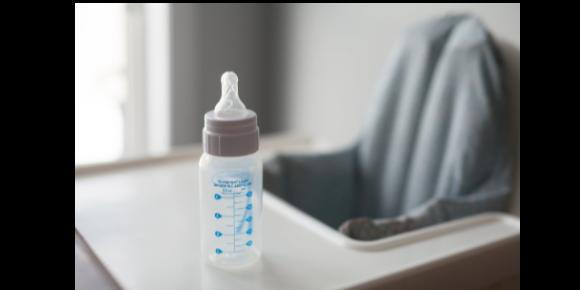Infant Breast Milk and Formula Storage Guidelines

- posted: Oct. 08, 2019
Infant Breast Milk and Formula Storage Guidelines
How long is it safe to leave out a bottle of breastmilk? How quickly do I need to give prepared formula before it is unsafe? Who knew feeding an infant was this confusing? Safe preparation and storage of infant breast milk and formula can be a complex topic, but it’s important to know that what you’re feeding your infant is safe. The CDC has provided information regarding safe storage and handling of human breast milk and formula preparation. These are guidelines for use at home, hospital settings may be different.
Breast Milk Storage Tips
Counter top or Table (Room Temperature) | Refrigerator | Freezer with a separate door | |
Storage Temperatures | 77 degrees F | 40 degrees F | 0 degrees F |
Freshly pumped/expressed milk | Up to 4 hours | Up to 4 days | Use within 6 months is best, 12 is acceptable |
Thawed Human Milk | 1-2 hours | Up to 24 hours | Never refreeze after it has been thawed. |
- Use breast milk storage bags or clean food-grade containers with tight fitting lids made of glass or plastic to store expressed breast milk.
- Never store in bags that are not specifically breast milk storage bags. Clearly label the bag with date and time of expression
- If you don’t think you will use freshly expressed breast milk within 4 days, freeze it right away. This will help to protect the quality of the breast milk.
- Freeze breast milk in small amounts of 2 to 4 ounces (or the amount that will be offered at one feeding) to avoid wasting breast milk that might not be finished.
- When freezing breast milk, leave about an inch of space at the top of the container because breast milk expands as it freezes.
- If you will be delivering breast milk to a childcare provider, clearly label the container with the child’s name and talk to your childcare provider about other requirements they might have for labeling and storing breast milk.
- Breast milk can be stored in an insulated cooler bag with frozen ice packs for up to 24 hours when you are traveling. Once you arrive at your destination, milk should be used right away, stored in the refrigerator, or frozen.
- Here is a great link to the CDC’s recommendation on handing and storage of breast milk https://www.cdc.gov/breastfeeding/recommendations/handling_breastmilk.htm
Formula Storage Guidelines
- Store unopened infant formula containers in a cool, dry, indoor place—not in vehicles, garages, or outdoors.
- Prepared infant formula can spoil more quickly than breast milk at room temperature.
- Use prepared infant formula within 2 hours of preparation and within one hour from when feeding begins.
- Prepared formula that is not needed right away can be stored in the refrigerator for up to 24 hours.
- Discard any leftover formula after the feeding. The combination of saliva bacteria and formula can cause the bacteria to grow. Bottles must be cleaned and sanitized before the next use.
- Here is a useful link for the CDC’s recommendation of preparing and storing infant formula https://www.cdc.gov/nutrition/infantandtoddlernutrition/formula-feeding/infant-formula-preparation-and-storage.html
Hopefully this post was helpful and answered any questions you might have had about breast milk/formula handling and storage. Remember at the end of the day that you are helping a human being eat and grow, now that is pretty amazing! Go you!

- posted: Oct. 08, 2019
Infant Breast Milk and Formula Storage Guidelines
How long is it safe to leave out a bottle of breastmilk? How quickly do I need to give prepared formula before it is unsafe? Who knew feeding an infant was this confusing? Safe preparation and storage of infant breast milk and formula can be a complex topic, but it’s important to know that what you’re feeding your infant is safe. The CDC has provided information regarding safe storage and handling of human breast milk and formula preparation. These are guidelines for use at home, hospital settings may be different.
Breast Milk Storage Tips
Counter top or Table (Room Temperature) | Refrigerator | Freezer with a separate door | |
Storage Temperatures | 77 degrees F | 40 degrees F | 0 degrees F |
Freshly pumped/expressed milk | Up to 4 hours | Up to 4 days | Use within 6 months is best, 12 is acceptable |
Thawed Human Milk | 1-2 hours | Up to 24 hours | Never refreeze after it has been thawed. |
- Use breast milk storage bags or clean food-grade containers with tight fitting lids made of glass or plastic to store expressed breast milk.
- Never store in bags that are not specifically breast milk storage bags. Clearly label the bag with date and time of expression
- If you don’t think you will use freshly expressed breast milk within 4 days, freeze it right away. This will help to protect the quality of the breast milk.
- Freeze breast milk in small amounts of 2 to 4 ounces (or the amount that will be offered at one feeding) to avoid wasting breast milk that might not be finished.
- When freezing breast milk, leave about an inch of space at the top of the container because breast milk expands as it freezes.
- If you will be delivering breast milk to a childcare provider, clearly label the container with the child’s name and talk to your childcare provider about other requirements they might have for labeling and storing breast milk.
- Breast milk can be stored in an insulated cooler bag with frozen ice packs for up to 24 hours when you are traveling. Once you arrive at your destination, milk should be used right away, stored in the refrigerator, or frozen.
- Here is a great link to the CDC’s recommendation on handing and storage of breast milk https://www.cdc.gov/breastfeeding/recommendations/handling_breastmilk.htm
Formula Storage Guidelines
- Store unopened infant formula containers in a cool, dry, indoor place—not in vehicles, garages, or outdoors.
- Prepared infant formula can spoil more quickly than breast milk at room temperature.
- Use prepared infant formula within 2 hours of preparation and within one hour from when feeding begins.
- Prepared formula that is not needed right away can be stored in the refrigerator for up to 24 hours.
- Discard any leftover formula after the feeding. The combination of saliva bacteria and formula can cause the bacteria to grow. Bottles must be cleaned and sanitized before the next use.
- Here is a useful link for the CDC’s recommendation of preparing and storing infant formula https://www.cdc.gov/nutrition/infantandtoddlernutrition/formula-feeding/infant-formula-preparation-and-storage.html
Hopefully this post was helpful and answered any questions you might have had about breast milk/formula handling and storage. Remember at the end of the day that you are helping a human being eat and grow, now that is pretty amazing! Go you!
Visit our Office
Suwanee Location
4395 Johns Creek Parkway
Suwanee, GA 30024
